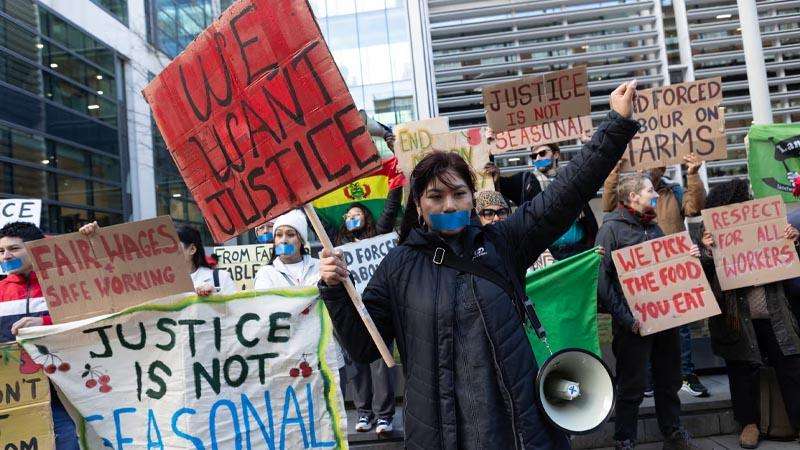This is a story of two countrysides. On Saturday, broadcasters spotlighted farmers protesting inheritance tax plans they fear will devastate family farms.
Meanwhile, a smaller protest the day before, held outside the Home Office, went largely unnoticed. A group of fruit and vegetable pickers, primarily from Latin America, rallied against what they described as the exploitation of migrant workers.
The two demonstrations came from different ends of the political spectrum. The migrant workers' protest, supported by the Landworkers’ Alliance and Unite, featured union banners and loudspeakers.
On the other hand, farmers gathered at a farm near Heathrow, preparing a tractor convoy past Windsor Castle to Maidenhead. Their protest was joined by Tory MPs and led by a friendly figure in a tweed cap and red trousers.
Despite their differences, this isn’t a story of conflict. Both groups shared common ground, agreeing they were bearing the burden of Britain’s cheap food system.
Outside the Home Office on Friday afternoon, Julia Quecaño Casimiro led proceedings, explaining through a translator that she and other people on the seasonal worker scheme had been treated “like animals”.
Employment tribunal hearings are due to begin this week to decide their claims for unlawful deduction of wages, unfair dismissal, discrimination and harassment against Haygrove, a business which runs five farms in the UK growing strawberries, cherries and other berries.
It employs more than 1,000 people to pick fruit and uses the seasonal worker scheme, a visa programme introduced after Brexit when fruit was left rotting in the fields because there was no one to pick it. Haygrove disputes the claims.
Some of the Spanish-speaking pickers have suffered discrimination by supervisors from eastern Europe, according to Catherine McAndrew of the Landworkers’ Alliance.
“They were promised decent wages and conditions, an opportunity that could change their lives, and they found nothing of the sort,” she said. “They were denied work, bullied by their supervisors and given the worst fields, because they were a different race for supervisors.”
McAndrew said there was substantial evidence of “widespread exploitation” of people on the seasonal worker visa. Part of the reason is that growers are under extreme pressure from supermarkets to drive down prices, and seasonal workers are usually employed through third-party agencies.
Research by the Landworkers’ Alliance into the fruit supply chain found that for a £2.30 punnet of strawberries, the farm received 50p, of which just 5p was profit, while workers received just 18p after deductions for tax, visa and accommodation.
“A lot of the retailers take the lion’s share, so the workers and the farm are left to compete,” she said. “If inheritance tax goes up, that leaves less value in the farm and a smaller amount of money for workers.” However, she said that CEOs of larger agribusiness farms like Haygrove could earn as much as £200,000 a year.
On Friday, supermarkets including Tesco, Lidl and Aldi joined Asda, Sainsbury’s and Tesco in supporting the farmers’ fight to persuade the government to scrap its plans to extend inheritance tax to farms. Previously farms could be passed down the generations tax free, but from April 2026 those inheriting farms worth more than £1m will need to pay 20%.
This is not enough to dissuade wealthy people from buying up agricultural land to reduce their tax bills, according to William Westacott, who runs his family’s 500-acre arable farm, but it would be crippling for people like him.
Another farmer, William Emmett, whose grandfather grew crops on what is now Heathrow airport, said that inheritance tax was only a problem for his family because investors had driven up land prices.
“It’s ironic that agriculture has seen land values lift in the last 20 years [because of investors],” he said. “If you’d asked me 20 years ago if I’d be worried about inheritance tax, the answer would have been no.”
So are farmers similarly concerned about the plight of seasonal workers? Some are. Colin Rayner, the tweed-clad organiser of the Windsor tractor convoy, said that although he did not employ seasonal workers on his 1,000-acre farm, he had seen abuses.
“I’ve seen gangmasters with sticks, and they beat them,” he said. “It’s horrific. The trouble is that because their margins are so tight, farmers employ gangmasters through agencies.”
Outside the Home Office, Alex Heffron, a PhD researcher who used to run a 12-cow microdairy, sums up the issue.
“The inheritance tax is a flawed policy that doesn’t really make sense,” he said. “Most working farms are over the threshold. They can pay the bill over 10 years, but it would equal the farm’s profits every year.
“So it makes it harder to positively reform the food and farming system. It’s too broad and it’s not actually going after the absentee landowners or tax dodgers, necessarily.”








.svg)



